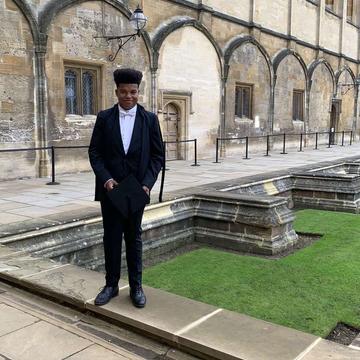Personal statements therefore should be written not just in praise of oneself, but also as a mechanism in which one can make oneself understand why you work so hard, why you really want to be at Oxford
Darian Murray-Griffiths is a first year studying History and Politics at Christ Church. He is from Worcestershire where he attended the local state schools.

There is always a wonderful feeling one gets as a History undergraduate at a place like Oxford because every step and every stone is something likely related to famous figures from history books, making one feel as part of living history. Whether it is eating fast food on the steps of the Martyrs’ Memorial which commemorates Reformation martyrs, or whether it is passing by Christ Church (a former monastery and Civil War palace of Charles I), or simply walking around colleges which have stood for the balance of more than 700 years, one always feels a sense of time and place in Oxford. It is that sense of history and of perspective which I think was key to me writing my personal statement at sixth form, about understanding that personally history is not just a dry subject related to archaeology or some distant past, but that history is responsible for so much of the who’s, what’s, and why’s of today. I think that coming to Oxford open days or even visiting the city for a day helps to put you mentally into a space where not only you can envisage yourself here but give you a physical and visual reminder of the ends to which you are working so incredibly hard for. I know of many friends and colleagues here who thrive off the energy and ambience of Oxford while working here, finding a historic and picturesque library to be conducive to thrashing out their best essays. Or a walk around a park or a meadow to give them much-needed peace in between bouts of stress, anxiety, or essay crisis.
I think that for those who are romanticists or sentimentalists, a History degree is a degree that allows you to let your imagination run wild, while contemplating facts which are also gruesome and shameful. As a Joint Honours student, I am lucky enough to witness both the romance and gore of History balanced with the cynicism and worldliness of Politics, meshing the two together in essays, to give me a sense of harmonious perspective in my outlook on life. It is the desire to find balance and to see both sides of the argument, while understanding context and human nature, that I think is important to historians today as we deepen our understanding of the past and its resonance with the present, even its putative impact on the future. Personal statements therefore should be written not just in praise of oneself, but also as a mechanism in which one can make oneself understand why you work so hard, why you really want to be at Oxford, and why your degree matters so much to you. I wrote my personal statement a few months after visiting Oxford for the University Open Day, and I think that the personal experience of Oxford for just 1 day and more helped me to form my Personal Statement because I now knew, fresh in memory, why it all mattered so much. Why I kept on going during days when one was down or moments when one had doubt or despair. If you can combine your personal experience with the motivations and personal qualities which you outline in your Personal Statement, it will not only impress the admissions tutors who read it, but perhaps impress yourself about the deeper meaning of what it means to apply to be a student at Oxford.